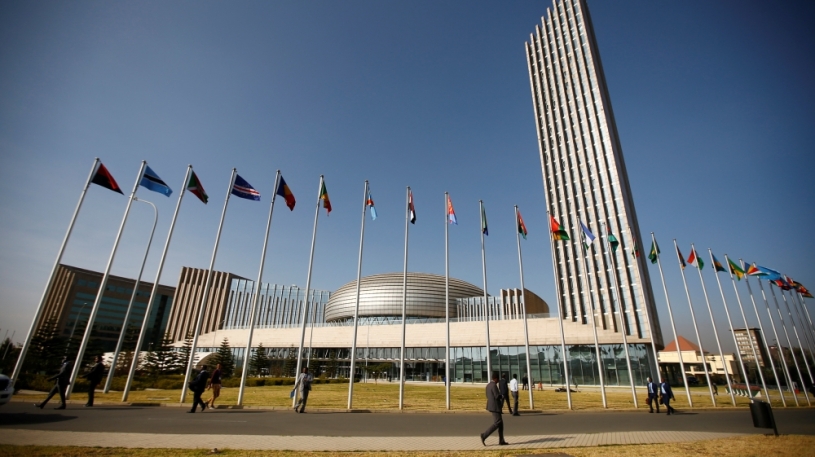By Caroline Gluck
Painting and drawing offers an escape for one refugee living in Tripoli at a time of conflict and a lockdown due to the COVID-19 pandemic
In an unfinished building in a downtrodden neighbourhood of Tripoli, Solomon Gebreyonas Alema, a 29-year-old Eritrean refugee, can be found most days sketching and painting.
One small room in the dimly lit, overcrowded building that houses around 200 refugees from Eritrea, Ethiopia and Sudan has been designated by the residents as an “art room” – a space for people to paint, draw, write and play music.
Since mid-March, few residents have been able to venture far from the building due to stringent restrictions on movement introduced to limit the spread of COVID-19 in Libya, as well as ongoing security concerns linked to the conflict in Tripoli, which until recently had raged for more than a year. This has prevented most from being able to earn money through daily labour.
“Painting means life to me, I don’t want to be separated from it,” said Solomon, as he displayed his sketches and drawings. “When we get money, we spend it on necessary essentials like food and rent. Even so, because art is a necessary thing for me, for my life, my friends and other people around me help in whatever way they can by providing some items for painting and drawing.”
Solomon has been drawing and painting since he was a young child. He is self-taught and never attended formal art classes. His faith informs much of his work – large canvases in rich, vibrant colours portraying scenes from the bible, including figures of saints.
Painting these not only gives him purpose and inspiration, said Solomon, but has also helped other Eritrean and Ethiopian refugees struggling to get by in Libya.
“We don’t have any place to pray here in this country. So we use these pictures” he explained. “When people pray, it gives them hope. Using this painting to pray helps them with their faith and makes them feel they are protected from danger.”
There are currently close to 49,000 registered refugees and asylum seekers living in Libya. Many face violence and abuse on their journeys here, as well as in detention when they reach the country. Most continue to face huge challenges on a daily basis as they struggle to get by.
Many were smuggled into the country, like Solomon, who left his home and family determined to find a safe place to study and make a career as a professional painter. He paid smugglers US$5,500 to take him to Europe, which he paid for with the help of his mother, who sold her gold jewellery, and money from relatives in the Eritrean diaspora.
His attempt to reach Europe by boat, however, ended when the vessel was intercepted by the Libyan Coast Guard, and he was put in a detention centre with others.
On his release into the urban community in Tripoli, he developed tuberculosis – a common disease among refugees living in cramped, unsanitary conditions – and re-entered another detention centre in order to seek medical assistance, which he was unable to afford outside with no means to support himself.
He is grateful now to be living in a place where he has the support of others in his community, despite the tough conditions.
“People’s thoughts are very much on coronavirus. They are so worried because most of the people live a hand-to-mouth existence,” he explained, saying that with his housemates and friends, food and other items are shared among the group.
“I honestly would prefer to spend everything I have on materials to paint. But life is very difficult and it is not easy to focus on painting when there are other really important things that are priorities for us, necessities for us to survive,” he said.
UNHCR, the UN refugee agency, and its partners provide help to refugees and asylum seekers in urban settings in Libya, including documentation, cash assistance to the most vulnerable, hygiene and household items, medical assistance and psychosocial support.
Together with the U.N. World Food Programme, the agency will also start providing monthly emergency food assistance for up to 10,000 refugees and asylum seekers until the end of the year, to help those struggling to provide for themselves having lost access to daily work due to the COVID-19 restrictions.
One of Solomon’s most recent sketches, which he is turning into a painting, shows life in Tripoli during the coronavirus pandemic. One side of the drawing depicts the city at war: shelling, fighting and tanks on the move; on the other side, a man wears protective clothing as he sprays disinfectant to fight the disease.
In the centre, surrounded by people who are praying and washing their hands, is a Madonna-like mother and baby. These central figures are protected by the shade of an umbrella, with the letters UNCHR written on it.
“I have tried my best to focus on my art,” he explained. “We have tried to stick with the little hope that we have. And one thing that has given us all hope is having UNHCR’s help.”
“We have a feeling that somehow, we are safe. We didn’t lose hope due to this and due to our faith. We didn’t give up.”
Source=https://reliefweb.int/report/libya/art-provides-comfort-and-hope-eritrean-refugee-libya






 Much of Solomon’s work is inspired by his faith, featuring images of saints and other biblical scenes © UNHCR/Mohamed Alalem
Much of Solomon’s work is inspired by his faith, featuring images of saints and other biblical scenes © UNHCR/Mohamed Alalem


























